'I’m calling from Israeli intelligence. We have the order to bomb. You have two hours'
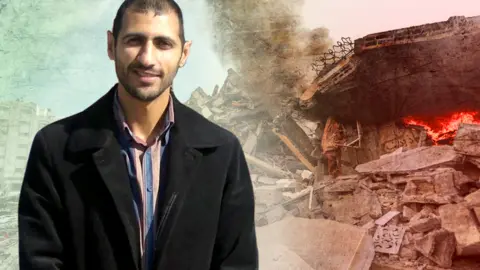 BBC/Getty
BBC/GettyThe call to Mahmoud Shaheen came at dawn.
It was Thursday 19 October at about 06:30, and Israel had been bombing Gaza for 12 days straight.
He'd been in his third-floor, three-bedroom flat in al-Zahra, a middle-class area in the north of the Gaza Strip. Until now, it had been largely untouched by air strikes.
He'd heard a rising clamour outside. People were screaming. "You need to escape," somebody in the street shouted, "because they will bomb the towers".
As he left his building and crossed the road, looking for a safe place, his phone lit up.
It was a call from a private number.
"I'm speaking with you from Israeli intelligence," a man said down the line, according to Mahmoud.
That call would last more than an hour - and it would be the most terrifying call of his life.

'We will bomb three towers'
The voice addressed Mahmoud by his full name and spoke in flawless Arabic.
"He told me he wanted to bomb three towers… and ordered me to evacuate the surrounding area."
Mahmoud's tower was not directly under threat - but he was suddenly responsible for evacuating hundreds of people. "I had the lives of people in my hands," he says.
He gathered his thoughts and told the man, who identified himself as Abu Khaled, not to hang up the phone.
As a 40-year-old dentist, Mahmoud says he has no idea why he was chosen for this task. But that day, he did everything he could to keep his community safe.
Directed by the voices of strangers, who always seemed to know how to reach him even when his battery ran out, he pleaded for the bombing to stop and screamed until his throat hurt for people to run away.
He led a mass evacuation of his neighbours - and then watched his neighbourhood explode in front of his eyes.
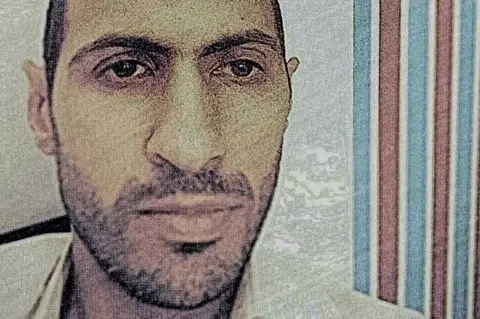 Mahmoud Shaheen
Mahmoud ShaheenDuring this conflict, the Israeli military has phoned Gazans sometimes to warn them ahead of air strikes - Mahmoud's account gives an insight into one such phone call in an unprecedented level of detail.
The BBC contacted Mahmoud after multiple al-Zahra residents identified him as the man who received the warning call.
We cannot independently verify the contents of the call, which he recounted roughly three weeks after the event. The details, however, match those on a community Facebook group from the day as well as satellite images before and after the bombing.
We know that day many hundreds of people were left homeless as the Israeli army bombed at least 25 residential blocks housing hundreds of apartments, destroying an entire neighbourhood. These people were forced to flee with what few belongings they could take, and were eventually dispersed across Gaza.
The IDF says it strikes military targets and these actions are subject to the "relevant provisions of international law".

'Fire a warning shot to prove this is real'
Mahmoud could not believe it when the man began speaking, he recalls.
People around him warned that the call may be fake. Since the war had begun, messages had been circulating in the community Facebook group warning of hoax calls and offering tips on identifying real Israeli evacuation orders.
Mahmoud asked the voice on the phone to fire a warning shot to prove this was real. If those still sleeping did not hear the screams from the streets then they would hear the shot, he thought.
A warning shot seemingly from nowhere, but perhaps from a drone, hit one of the apartment blocks under threat, he says.
"I asked him to 'shoot another warning shot before you bomb'," Mahmoud says. One more rang out.
Now that Mahmoud knew it was real he tried to stall, asking the man to be patient. "I told him: 'Don't betray us and bomb while people are still evacuating.'"
The man said he would give Mahmoud time - he said he did not want anyone to die, the dentist recalls.
Mahmoud responded that he didn't want anyone to even be injured.
He kept the call going as he rushed around the neighbourhood, urging people to evacuate. One neighbour remembers the dentist "just shouting", then others joined in.
"I didn't want to know that there's someone I could have saved and I didn't," Mahmoud says.
Hundreds of people poured into the streets that morning. Residents of this usually peaceful city were screaming and running, some of them wearing their pyjamas or prayer clothes.
The area - just north of the Wadi Gaza river, a point that Israel has been ordering civilians to move south of since the early days of the war - was made up of modern blocks of flats as well as shops, cafes, universities, schools, and parks. It was in these parks that people began to gather.
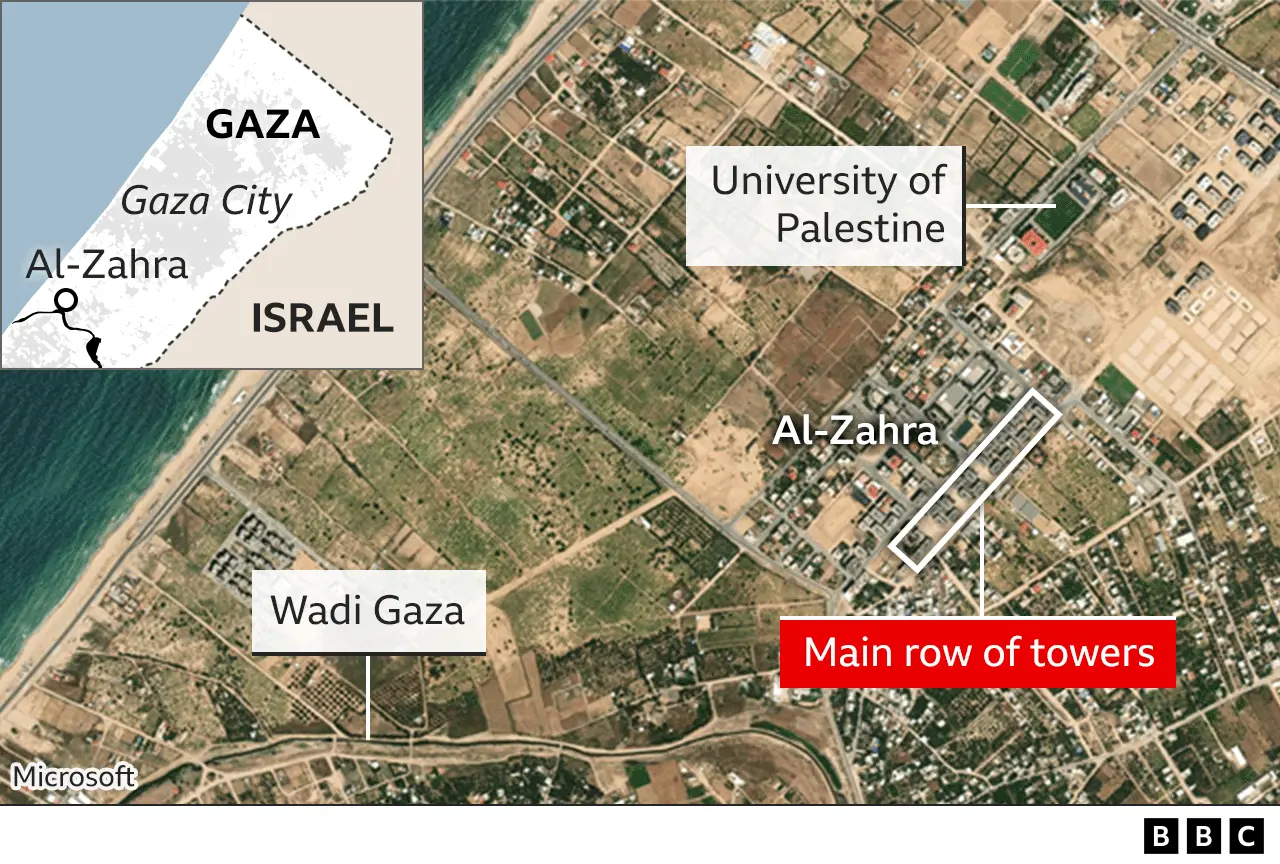
Mahmoud could not understand why his neighbourhood had become a target. "I tried my best to stop him. I asked, 'Why do you want to bomb?'
"He said, 'There are some things that we see that you don't see.'"
The man did not explain what he meant.
"It is an order from people bigger than me and you, and we have an order to bomb," the voice added, according to Mahmoud.
When the areas around the buildings were clear the man informed Mahmoud that the bombing would begin.
Mahmoud panicked - what if they bombed the wrong building by mistake? "Wait a bit," the man told him, he says.
An Israeli aircraft circled overhead.
Mahmoud stared at the three towers that neighboured his own apartment block. Then one of them was bombed.
"This is the tower that we want, stay away," the man on the phone said as the building fell, according to Mahmoud.
The two other blocks were then destroyed.
Images taken in al-Zahra that morning show rubble in the place of those three apartment blocks, while a video shows residents wandering around in shock and bewilderment as they view the immediate aftermath of the strikes. A post on the community Facebook group at 08:28 local time says three towers had been "wiped out completely".
When the bombing stopped, Mahmoud remembers the voice telling him: "We've finished… you can go back."
Mahmoud didn't understand what he had just witnessed. He had lived in this Gaza neighbourhood for 15 years, running a busy dental practice and bringing up his children there.
"I told him al-Zahra is a civilian area. No one is a stranger here… I tried to make him understand. It is not a border area, we have not had previous clashes. It was always an area outside of trouble," he says.
A post that morning on the community Facebook group urged neighbours to offer beds, food and water to those made homeless.
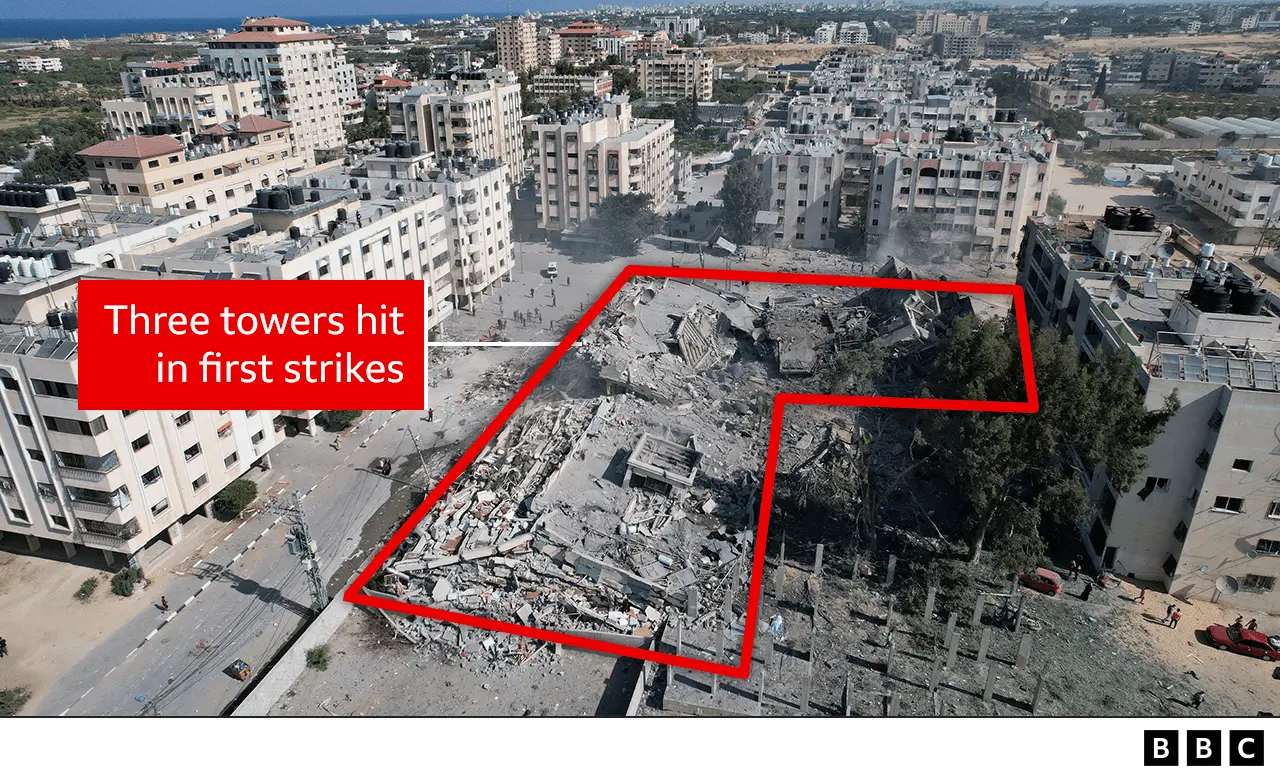
People searched for shelter or places to flee to. Local authorities started clearing the debris from the roads, and putting out fires in the rubble.
Those whose homes remained intact returned. Some people felt a sense of security.
"We went back [home], thinking they won't bomb again," one told us.

A missed call from a private number
Later that day, Mahmoud had just finished his Isha, or night-time prayers, at his flat when he saw a missed call from a private number on his phone.
His heart sank. "Immediately I understood there would be an evacuation and bombing, but I didn't know what the target would be. I thought it might be my home, it might be the home next to me," he says.
His phone soon rang again. A different man was on the line.
The voice said they had realised Mahmoud was a "wise man" after the events of that morning, which is why they were calling him again.
The man introduced himself as Daoud.
Mahmoud was unnerved by the level of detail the man had about his life - by the familiar way the man addressed him and referred to his son's name.
According to Mahmoud's account, this man then made some attempt to explain what was happening in Gaza.
"He started telling me: 'Did you see how they [Hamas] slaughtered those children with knives?'…
"I told him that according to our Islamic religion, this is forbidden," Mahmoud recalls.
He urged the voice against "mass punishment", but Mahmoud knew it was hopeless.
Mahmoud says the man told him more buildings would be destroyed that night, and the dentist would need to order his neighbours to evacuate once again.
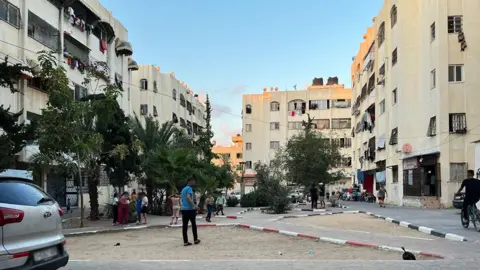 Qutaiba Kolthoum
Qutaiba Kolthoum At first, he was told the targets were two buildings next to the three that had been destroyed that morning, as well as a second block of towers.
"He said to me, 'We want you to inform people to evacuate the area,' and I said, 'You need to give me time.'"
He got to work. "We evacuated all the people and even evacuated a third block because it was so close to the second one," Mahmoud says.
At this point al-Zahra was largely in darkness. Residents say electricity had gone and they were using phones and torches for light as they filled the streets. Some had time to grab pre-packed bags as they left their homes, with items like spare clothing, water, phones and first aid kits. Others did not.
"It was absolute horror," one resident, Abdullah al-Khatib, says. "We didn't know where to go. We literally just ran out, taking nothing."
"Can't see clearly. Just evacuate," another says by WhatsApp message, recalling the events of that night. "I just focus on being safe with family."
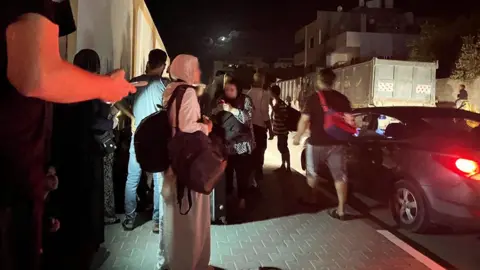 Qutaiba Kolthoum
Qutaiba KolthoumMahmoud continued trying to buy as much time as he could, talking to the man who called himself Daoud until everyone was clear of the area and had been able to get into their cars if they wanted to drive away.
Three buildings were destroyed. As Mahmoud watched the destruction, the man on the phone said three more buildings would be bombed and then the residents would be allowed to return.
But a change of orders came suddenly.
They would bomb the full row of apartment blocks on the eastern side of the street, Mahmoud recalls being told.
This was more than 20 tower blocks, and hundreds of homes.
"There were people we hadn't evacuated yet because there was no warning about those buildings. I told him, 'At least give us until morning, in night time, where will the people go?'
"The answer was, 'The orders have been received, and we will bomb all towers within two hours.'"
Mahmoud screamed at people to clear the area, running from block to block.
Residents describe chaotic scenes of adults shouting and children weeping. Some parents and children lost one another in the melee.
Despite the panic, Mahmoud stayed on the phone the whole time, trying his best to delay the bombing.
The voice on the other end of the phone continued, without emotion.
"He even told me, 'Take your time. I won't bomb unless you give me permission.'
"I said 'No, it's not my permission. I don't want you to bomb anything. If you want me to evacuate, I will evacuate for the safety of the people, but if you want to bomb, don't tell me you need my permission.
"'It's not Mahmoud Shaheen who will bomb al-Zahra.'"
An elderly disabled woman lived in the last block of apartment buildings. Mahmoud and those around him told locals to "drive like crazy" to reach her and get her out.
He and others also worried about a local elderly care home. But the man on the phone said "he'd just destroy the residential buildings", according to Mahmoud.
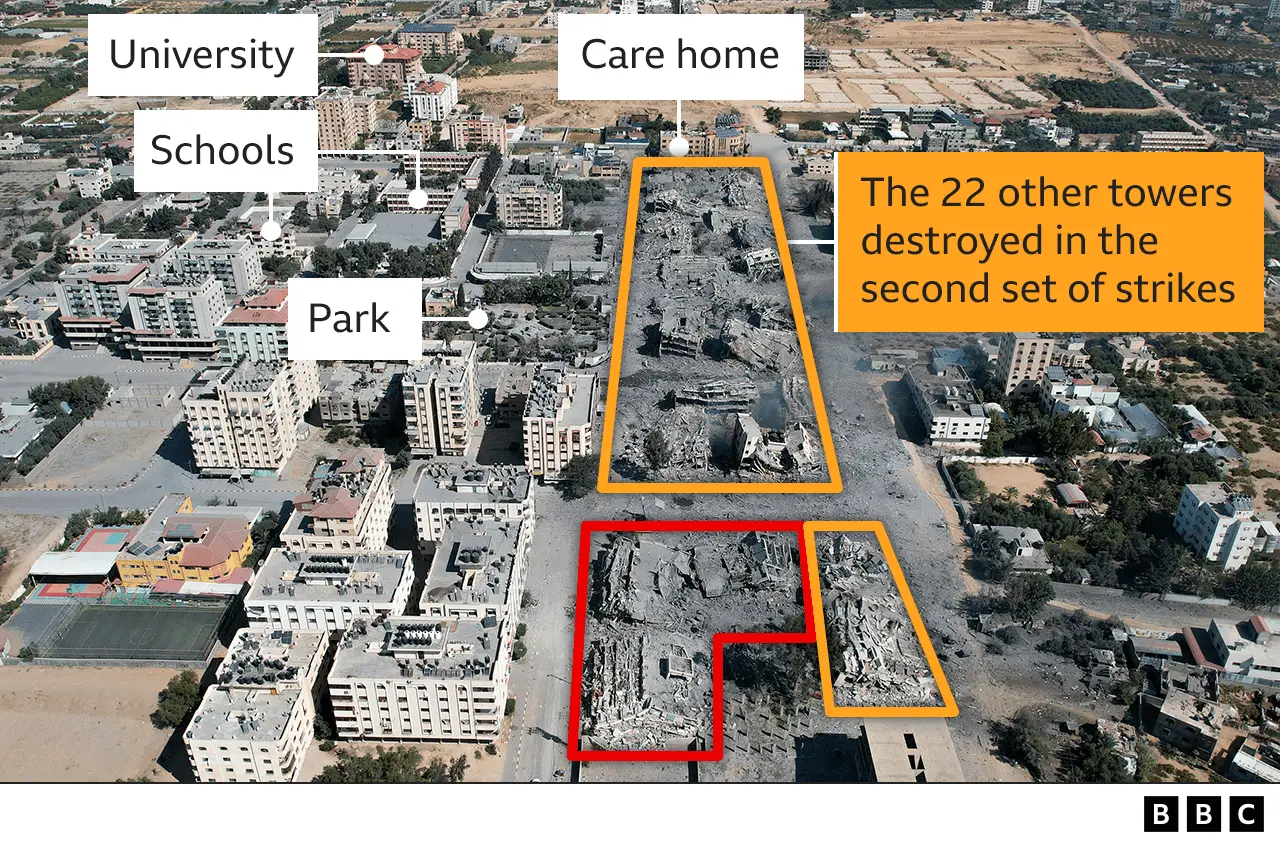
Mahmoud says what he and his neighbours witnessed that night "wasn't a small bombing" but the "complete destruction of buildings", as the residential blocks were levelled one by one.
"It was a very hard night for all the people of al-Zahra."
Photos and video footage posted by residents of the community show the aftermath of the evening bombing.
A post on the Facebook group at 21:11 local time says: "Al-Zahra towers are being bombed right now. God have mercy."
One resident speaking to the BBC via WhatsApp message recalled the confusion in the streets. "We didn't know where we should go - some said we must go to schools, some said we should go to Al Nuseirat [a refugee camp south of the neighbourhood]. During that [time] came cruel bombs."
Mahmoud asked the man on the phone where he should take his neighbours.
"He said, 'Either take them east or west'. I said, 'To take them east will be hard, because to the east of al-Zahra is Al Mughraqa - an already unsafe area. People were already scared to go there.'
"He told me, 'Take them west to Palestine Street'. I suggested the University of Palestine and he said yes."
Mahmoud led the crowd, which included not just residents of the tower blocks, but also other displaced people who had sought shelter in al-Zahra after fleeing their own homes elsewhere in northern Gaza.
Other residents have confirmed that they went to the university, and a video posted on the Facebook group shows people walking and driving in that direction, as the person behind the camera prays.
Mahmoud hangs up - but a neighbour's phone rings
Mahmoud says people waited at the university in fear, listening to the drumming of explosions outside. Frightened dogs in the street tried to find a spot to lie down between women and children.
At one point, Mahmoud says the voice on the phone asked him how much battery he had left. He had 15%. They told him to hang up to preserve it and that they would call back again.
Frequent calls followed.
"They would ring to tell me, 'Now we will bomb another building,' 'Now we will bomb another one.' They said, 'We will keep calling until we finish,'" Mahmoud says.
At one point a neighbour's phone rang, with the voice asking for Mahmoud Shaheen.
Mahmoud had been keeping his distance from his wife and five children all day - both because he was busy evacuating people and because he feared that his contact with Israeli intelligence made him a target.
At the university, he checked they were OK, and then left them again.
The residents of al-Zahra endured a sleepless night. The crowd looked to Mahmoud for updates and answers.
"[They were] saying 'Hey doctor, did they call you so we can go back? Did they tell you where they will hit?'"
Dawn broke. A post on the community Facebook group at 08:53 local time said: "The bombing is still going on up to this moment."
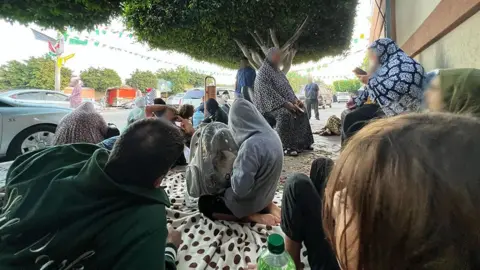 Qutaiba Kolthoum
Qutaiba KolthoumVideos shared overnight captured flashes of orange in the night sky. Others shot in the morning show plumes of grey smoke rising with the sun over the city.
Mahmoud and the man who called himself Daoud kept speaking until the streets went quiet. Then the calls abruptly stopped without any further instructions for the people of al-Zahra.
"They didn't tell us to go back to our homes, or to evacuate or leave the area. So people waited until noon, and then they started to move," Mahmoud says.
In the hours and days that followed, the community of al-Zahra, like many in Gaza, disbanded.
"Even for the people whose homes were still standing, there are no services left… the sewage systems are damaged, there is no bakery, there is no supermarket, there is no water, no electricity," Mahmoud says.

Mahmoud's block was not destroyed, although it was severely damaged. The neighbourhood where he built up his dental practice over 15 years, and became a linchpin of the community, is now gone. There is nothing left for him in al-Zahra.
He has taken his family to another region of Gaza, where he is staying in a friend's house that is crowded with people.
"I don't think about my clinic or my house, I just pray that I survive and stay alive," he says.
"Material things are nothing, you could die at any second right now. We don't think about anything else."
Israel is known to have warned Gazans by calling them, texting them and dropping leaflets before bombing. But in some cases, civilians say they have not been warned ahead of time.

More on Israel-Gaza war
- Follow live: Latest updates
- From Gaza: Palestinian given two hours to evacuate whole neighbourhood
- From Israel: Pain still raw a month after Hamas attacks
- Watch: The devastating effects of war on Gaza's children
- Explained: Who are the hostages taken by Hamas from Israel?
- History behind the story: The Israel-Palestinian conflict

The IDF told the BBC that as part of its "mission to dismantle the Hamas terrorist organisation [it] has been targeting military targets across the Gaza Strip". Strikes on military targets were subject, it said, to "relevant provisions of international law, including the taking of feasible precautions to mitigate civilian casualties".
"Hamas continues to attack Israel from across the entire Gaza Strip. Hamas has embedded itself in civilian infrastructure and operates across the entire Gaza Strip. The IDF is determined to end these attacks and as such we will strike Hamas wherever necessary."
The Hamas-run health ministry in Gaza says more than 10,000 people have been killed by Israel since the war began - more than a third of them are children. Israel's retaliatory airstrikes in Gaza followed Hamas gunmen rampaging into Israel on 7 October, killing 1,400 people, including many women and children, and taking hundreds of others hostage.
Thanks to Mahmoud's efforts, it is believed that none of his neighbours died that day. But his account reveals the panic and anguish of a Palestinian community as they watched their homes and everything they love blow up around them.
The BBC has spoken to multiple families who lived in al-Zahra, a neighbourhood of professionals and entrepreneurs, in which families ate falafel and pizza on the beach together, and children played football in the dawn light as the call to prayer sounded across the rooftops.
In the second part of this story, we will bring you into the lives of the people who called this place home - of a prosperous and vibrant community that was eradicated overnight.
Additional reporting: Muath Al Khatib and BBC News Arabic's Dima Al Babilie
Visual Journalism: Mike Hills
Video verification: Shayan Sardarizadeh
Edited by Samuel Horti
